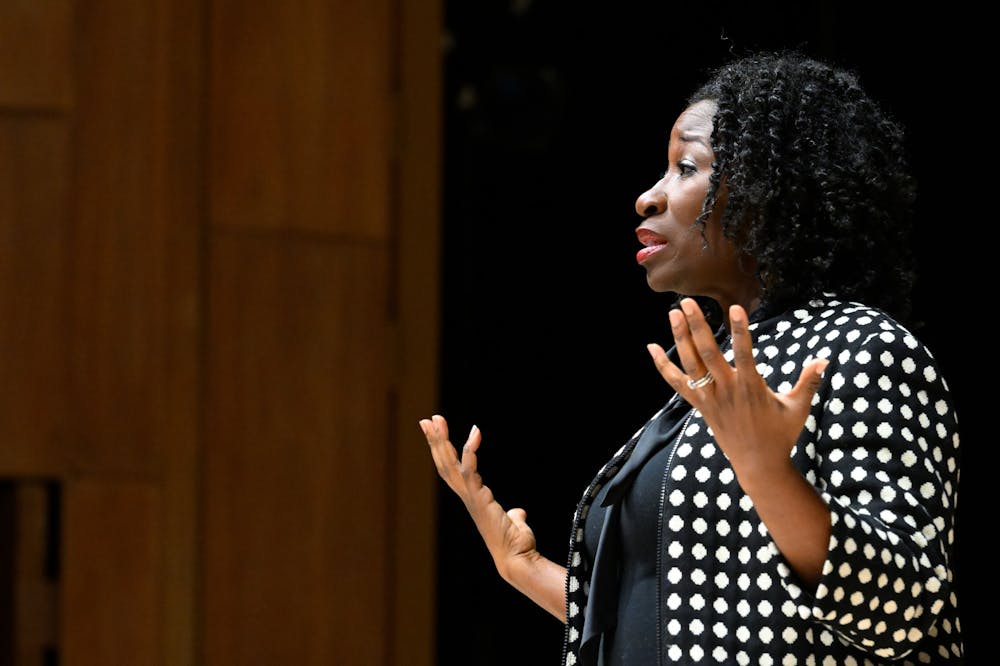On Wednesday, Feb. 12, Judge Victoria Pratt headlined the first Hopkins Lecture Series event of the spring semester, focusing on criminal justice reform in the 21st century. The event was held in Shriver Hall.
As Chief Judge of the Newark Municipal Court in Newark, New Jersey, Pratt also presides over Newark Community Solutions, an alternative sentencing program providing an alternative to jail and fines for low-level offenders. She has advocated for criminal justice reform across the United States and abroad, and has given a TED talk, guest lectures and keynote addresses on the matter.
During the event, Pratt shared insights and anecdotes from her two-decades-long legal career, as well as her childhood experiences that shaped her outlook on law and justice.
“My upbringing was a combination of first generation immigrant values, the Black is beautiful, and the Civil Rights movement,” she said. “My parents taught me that you treat everyone you meet with dignity and respect, no matter how they spoke, no matter how they dressed. The principles of fairness were instilled in me at a very early age.”
Pratt then transitioned to a discussion of procedural justice and its impacts on society. She noted that the interactions most people have with the criminal justice system are hostile and that many are confused on the nature of proceedings and their consequences. Pratt stressed the importance of dignity, respect and fairness to improve people’s experience with the system.
“The simple idea of procedural fairness to others... is an evidence-proven idea that, if people believe they are treated with dignity, respect and fairness, they will trust the justice system,” Pratt said. “It builds the public’s trust in the system. They will also accept judge decisions, even if the judge goes against them, if they believe that they received dignity, respect and fairness.”
Pratt then expounded upon the principles of procedural justice: voice, neutrality, understanding and respect. Beginning with voice, she underscored the importance of giving people in the justice system the opportunity to speak, tell their story and ask questions. Next, she stressed that court officials must remove their personal egos and biases from the legal process instead of making presumptions or allowing prejudices to influence decisions.
She then described the principle of understanding and that people develop more trust for the
legal process if they understand what is going on — instead of “legalese,” Pratt argued for the use of “plain English.” Finally, Pratt talked about the value of respect: if you respect each person and meet them where they are, she noted, they will respect the authority of the courts.
To illustrate these principles in action, Judge Pratt recalled different moments in her judicial career, emphasizing how everyone in the court system, from judges and prosecutors to bailiffs and clerks, has a role to play in ensuring that people passing through the system are treated with dignity.
In an interview with The News-Letter, sophomore Kiran Sabharwal reflected on Pratt’s commentary on personal bias in the criminal justice system and how it can be applied to careers outside the legal realm.
“Something that really stuck with me is... releasing ego from the equation when thinking about the justice system, and I think this applies to every job that people can take on,” she said. “It’s really important to leave your initial stereotypes and gut reactions out the door, and really be open to understanding people. That’s how you can really help people beyond the strict confines of your job.”
Pratt then demonstrated how procedural justice can transform people’s lives when approached in a way that adheres to its principles. To illustrate, Judge Pratt referenced an example of a woman who, after being rehabilitated from a drug addiction and years of prostitution, has become a powerful voice on Capitol Hill advocating for women’s rights.
Pratt concluded with a call to action: “You have to do that thing that you think you cannot, because that is where the magic happens.” She urged students of all academic interests and career plans to pursue their aspirations, regardless of how unrealistic they may seem.
Max Rho, a third-year undergraduate student at Hopkins, described his reasons for attending the event in an interview with The News-Letter.
“I wanted to hear a different perspective on how we could improve our justice system and make it more impartial,” he said. “There’s a certain stigma towards [the justice system], that people don’t gravitate towards it because they fear that it will always be against them, so I wanted to see a different perspective on how we could possibly improve on that.”
Lana Swindle contributed reporting to this article.





